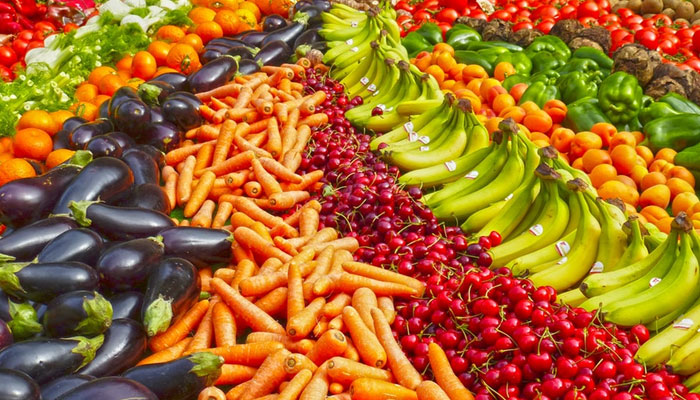Current food system can feed only 3.4 bn people, says study
RAWALPINDI: Our current food system can feed only 3.4 billion people without transgressing key planetary limits, according to an analysis of the global farming system. However, reorganising what is farmed where – along with some changes in diets – would enable us to feed 10 billion people on a sustainable basis, suggests the analysis.
“We should not go any further in the direction of producing food at the cost of the environment,” says Dieter Gerten at the Potsdam Institute for Climate Impact Research in Germany, an author of the study, reported foreign media.
In 2009, researchers identified nine so-called planetary boundaries: limits that we shouldn’t exceed if we want to maintain Earth’s life-support systems. Gerten’s team looked at the four boundaries that are relevant to farming: not using too much nitrogen, which causes dead zones in lakes and oceans; not taking too much fresh water from rivers; not cutting down too much forest; and maintaining biodiversity.
The team’s conclusion is that half of food production today violates these limits. However, this analysis is also the first to provide insights into where, geographically, these limits are being transgressed. By changing what is farmed where, the team says it would be possible to feed 10 billion people within the four limits.
This would involve rewilding farms in areas where more than 5 percent of species are threatened; reforesting farmland where more than 85 percent of tropical forest has been cut down; reducing water withdrawal for irrigation and other purposes where too much is taken; and decreasing nitrogen fertilisation where levels in surface water are too high. Farms could be expanded in areas where these limits are not being exceeded.
It could, for example, mean restricting fertiliser use in parts of eastern China and central Europe, and expanding it in parts of sub-Saharan Africa and the western US.
-
 New Guest Host Announced For The Kelly Clarkson Show
New Guest Host Announced For The Kelly Clarkson Show -
 Why Prince William’s Statement Over Jeffrey Epstein ‘says A Lot’
Why Prince William’s Statement Over Jeffrey Epstein ‘says A Lot’ -
 Paul McCrane Reveals Why Playing Jerks Became His Calling Card
Paul McCrane Reveals Why Playing Jerks Became His Calling Card -
 Prince William, Kate Middleton Thrashed For Their ‘bland’ Epstein Statement
Prince William, Kate Middleton Thrashed For Their ‘bland’ Epstein Statement -
 Bad Bunny Stunned Jennifer Grey So Much She Named Dog After Him
Bad Bunny Stunned Jennifer Grey So Much She Named Dog After Him -
 Kim Kardashian's Plans With Lewis Hamilton After Super Bowl Meet-up
Kim Kardashian's Plans With Lewis Hamilton After Super Bowl Meet-up -
 Prince William Traumatised By ‘bizarre Image’ Uncle Andrew Has Brought For Royals
Prince William Traumatised By ‘bizarre Image’ Uncle Andrew Has Brought For Royals -
 David Thewlis Gets Candid About Remus Lupin Fans In 'Harry Potter'
David Thewlis Gets Candid About Remus Lupin Fans In 'Harry Potter' -
 Cardi B And Stefon Diggs Spark Breakup Rumours After Super Bowl LX
Cardi B And Stefon Diggs Spark Breakup Rumours After Super Bowl LX -
 Alix Earle And Tom Brady’s Relationship Status Revealed After Cosy Super Bowl 2026 Outing
Alix Earle And Tom Brady’s Relationship Status Revealed After Cosy Super Bowl 2026 Outing -
 Why King Charles Has ‘no Choice’ Over Andrew Problem
Why King Charles Has ‘no Choice’ Over Andrew Problem -
 Shamed Andrew Wants ‘grand Coffin’ Despite Tainting Nation
Shamed Andrew Wants ‘grand Coffin’ Despite Tainting Nation -
 Keke Palmer Reveals How Motherhood Prepared Her For 'The Burbs' Role
Keke Palmer Reveals How Motherhood Prepared Her For 'The Burbs' Role -
 King Charles Charms Crowds During Lancashire Tour
King Charles Charms Crowds During Lancashire Tour -
 ‘Disgraced’ Andrew Still Has Power To Shake King Charles’ Reign: Expert
‘Disgraced’ Andrew Still Has Power To Shake King Charles’ Reign: Expert -
 Why Prince William Ground Breaking Saudi Tour Is Important
Why Prince William Ground Breaking Saudi Tour Is Important




